|
Sandip Wilson Summer is a time to think of new ways to connect literature with curriculum while planning for the return to school in the fall. The fiction and nonfiction books in this column will provide topics of discussion and inquiry related to contemporary issues, showing students ways individuals have taken action to promote the welfare and dignity of others. 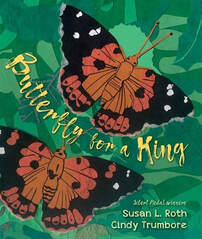 Butterfly for the King: Saving Hawai'i's Kamehameha Butterflies. Susan L. Roth & Cindy Trumbore. Illus. by Susan L. Roth. (2021). Lee & Low. In 2009, a group of fifth graders decided that Hawai‘i should have a state insect and selected the Kamehameha butterfly, an insect that lives only in Hawai‘i and is named after the king who, in 1812, united all the islands into one kingdom. The children lobbied the government and educated the public about the butterfly, whose numbers were shrinking. Their actions inspired a partnership between government, university, and citizen scientists to learn about, protect, and propagate the butterfly. In this beautifully crafted picture book, a short statement at the top of each double spread and a paragraph of related information in smaller print at the bottom explain the history and work of the Pulelehua Project and are set against a background of Susan Roth’s colorful cut-paper collage artwork. Back matter includes an afterword with more information on the Kamehameha butterfly and children’s involvement in the project, photographs, an illustrator’s note, and authors’ sources. (PreK Up) 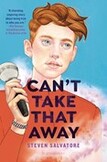 Can’t Take That Away. Steven Salvatore. (2021). Bloomsbury. High-school student Carey Parker, who identifies on some days as he or she and as they on other days, wishes to be a diva but has no confidence, although they are supported by their best friend, Monroe (Roe); their mother and grandmother; and Cris, the composer and DJ with whom they fell in love. Carey auditions for the part of Elphaba in the production of Wicked encouraged by Phoebe, the smartest person in the class, who is auditioning for the part of Glinda. When teacher Mr. Jackson works to cancel the production on grounds that it represents a homosexual agenda, the students take action, speaking to the school board, circulating a petition to challenge Mr. Jackson, and staging a one-day walkout in support of the production in this novel of friendship, discovery, social action, and loyalty. (Gr 9-12) 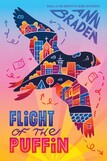 Flight of the Puffin. Ann Braden. (2021). Nancy Paulsen. Four middle-school students tell their stories in alternating chapters. Libby loves drawing colorful scenes and adding encouraging statements on index cards, which she leaves in random places around her Vermont town. Jack attends a nearby rural school and wants to protect it from closure by the board of education. Vincent, in Seattle, loves puffins, mathematics, and triangles, but is bullied for his interests and clothes. T, who says they are neither a boy nor a girl, lives on the street to be free of their family, who does not accept their identity. Libby, who learns of Vincent’s school problems by coincidence, sends one of her cards to him. Vincent and T become friends when T gives him a shirt after a bullying event that leaves him shirtless. When Vincent happens to see a news report of Jack’s struggle with the school board, he sends Jack an encouraging letter. These four stories of identity and friendship in this timely novel illustrate how individuals can support others through acts of kindness. (Gr 6 Up) 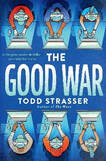 The Good War. Todd Strasser. (2021). Delacorte. Middle-schooler Zach hides under a hoodie and is bullied by Crosby and Gavin. Fellow student Caleb wins a grant for the school to conduct an after-school esports club, and invites Zach to participate. In a game depicting World War II, The Good War, the Axis team, which includes Crosby and Gavin, plays against the Allies, which includes Zach and Caleb. As the Axis loses rounds, Crosby finds someone to help them, but turns out to be part of a neo-Nazi white supremacist group, who hacks the game and involves Crosby’s team in hate language. Caleb discovers Zach is a resourceful person, a genius with video games, and a wise strategist. The surprises in this timely novel of friendship, teamwork, and identity demonstrate how people can bring unexpected talents to solving problems. (Gr 6-8)  Hear My Voice/Escucha mi voz: The Testimonies of Children Detained at the Southern Border of the United States/Los testimonios de jóvenes detenidos en la frontera sureña de los Estados Unidos. Warren Binford (Ed.). (2021). Workman. In 2019, children ages five to seventeen from Mexico, Central America, and Ecuador who were detained in the Border Patrol Station in Clint, Texas, entrusted their stories of hope, despair, fear, hunger, crowding, cold, separation from families, and denial of medical care, to Warren Binford, a private citizen selected to inspect border facilities. Double-spread illustrations by Latinx illustrators, rendered in different media and styles, accompany the excerpts of the stories compiled for Project Amplify, which Binford founded. The book is in Spanish when read in one direction and in English when read in the other. Back matter includes information on Project Amplify and how it has inspired citizen activism as some people delivered things for the children while others found ways to tell their stories in song, theater, and social media. (Gr 3 Up) 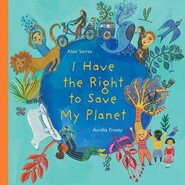 I Have the Right to Save My Planet (I Have the Right #2). Alain Serres. Trans. by Shelley Tanaka. Illus. by Aurélia Fronty. (2021). Groundwood. A child explains children’s right to air, bird song, wildflowers, and everything in nature and their right to know what is happening in the world that challenges the survival of plants, animals, and clean air and water. The child goes on to promote the right to take action. “Because we will protect our planet well and share what we have.” The child considers various problems addressed by the United Nations Convention on the Rights of the Child and explains, for example, how eating and drinking are connected to farming and preservation of clean water affecting everyone, an awareness necessary to sustainably develop the planet. The book with its detailed, colorful illustrations rendered in gouache is a companion to I Have the Right to Be a Child (2012). A third book in the series, I Have the Right to Culture will be published in October 2021. (PreK Up)  Kids on the March: 15 Stories of Speaking Out, Protesting, and Fighting for Justice. Michael G. Long. (2021). Algonquin. Kids on the March surveys the involvement of children in social, economic, political, and more recently, environmental justice for more than one hundred years. Young people have organized some of these marches such as the Better Schools March in 1951 in Richmond, Virginia, that became part of the Brown vs. Board of Topeka Supreme Court case. The book starts with the story of the March of the Mill Children in 1903 from Philadelphia to President Roosevelt’s summer residence at Oyster Bay, Long Island, New York, in which children participated advocating for shorter work weeks in textile mills, and ends with the Stand with Black Youth March in 2020, which was organized in the wake of George Floyd’s death, to protest institutions and practices that feed racism. The book includes an introduction with a timeline of marches, photographs, and source notes. (Gr 6-8) 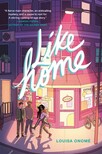 Like Home. Louisa Onomé. (2021). Delacorte. High-school student Chinelo loves her neighborhood of Ginger East, a fictional urban community with a rich tradition of families helping one another, and is sad to see friends leave for more wealthy neighborhoods after a shooting in the amusement arcade two years earlier. Nigerian-Canadian Nelo dreads the opening of the huge box spice store that will eclipse the store of the Vietnamese-Canadian Tran family and sees a gradual gentrification of the neighborhood’s much-loved shops. When a brick is thrown through the window of the Tran family’s store forcing them to close, Nelo decides she has to prove someone from outside the community committed the vandalism, while Maree, a girl who moved from the neighborhood, does an interview telling a false story of a robbery. In trying to preserve the neighborhood, Nelo learns that her values and purposes may differ from those of others. (Gr 6 Up)  Our Skin: A First Conversation About Race (First Conversations #1). Megan Madison & Jessica Ralli. Illus. by Isabel Roxas. Rise x Penguin Workshop. With their introduction to the science of skin color, Megan Madison and Jessica Ralli describe the many skin tones children see in their lives, which are depicted in Isabel Roxas’s bright watercolor illustrations on each double spread of this board book. Following a brief history of how one skin tone became seen as better than others, they provide examples of racism such as unfair rules that only white children can play, dark-skinned children playing the bad guy in pretend games, saying something mean to someone else, and believing princesses have blond hair. The examples in the book promote awareness of racism and inspiring discussions on how children treat one another. (PreK-Gr 2) 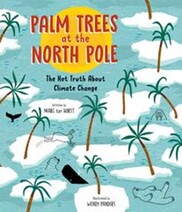 Palm Trees at the North Pole: The Hot Truth About Climate Change. Marc ter Horst. Trans. by Laura Watkinson. Illus. by Wendy Panders. (2021). Greystone Kids. This comprehensive inquiry into climate change provides a history of the Earth’s climate, discussing the creation of the Earth’s atmosphere, land, seas, and the nature and process of the ice ages before explaining how we have built knowledge of climate change. Chapters show how warming of the atmosphere occurs and its consequences, include information on ways to slow the effects of climate change and to address causes, present multiple perspectives on consequences, and discuss whether climate change is occurring. The humorous, conversational language of the text, complemented by colorful illustrations, provides information for discussion and considers many ideas for actions people can take. Each chapter has an “In which you will . . .” introduction on what will be covered and an interest-catching “In short” statement. Back matter includes a “Climate Bingo” activity and an index. (Gr 3 Up) 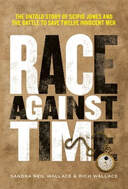 Race Against Time: The Untold Story of Scipio Jones and the Battle to Save Twelve Innocent Men. Sandra Neil Wallace & Rich Wallace. (2021). Calkins Creek. In 1919, African-American sharecroppers, World War I veterans, in Hoop Spur, Arkansas, meet in their local church to discuss the merits of unionizing for better prices for their cotton. Local people attack and burn the church, killing and injuring many people and arresting others, and report the incident as a defensive measure against violent sharecroppers. The twelve arrested men are quickly tried and sentenced to death, accused of planning an uprising. Scipio Jones, a well-known lawyer in Little Rock, aware of the increasing accusations of white communities that Black people were causing riots, undertook the defense to free the dozen men that took five years, exhausting every legal step in state and federal courts before they were acquitted. This chronicle of a little-known story includes an epilogue, an author’s note, and, in the back matter, a bibliography, list of personal visits, and source notes. (Gr 6 Up) 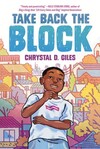 Take Back the Block. Chrystal D. Giles. (2021). Random House. Middle-school student Wes prefers to play video games with his friends in Kensington Oaks, but as he sees neighbors selling their houses to a land developer and his father gets new offers to sell their house, he worries that the neighborhood will be lost. To build community feeling, Wes organizes a neighborhood party with a potluck picnic, dancing, and a presentation of slides of the families who live there. When he undertakes a class inquiry into social action, he discovers the history of the neighborhood, originally named Pippin Village after its now-forgotten founder, Frederick Pippin, a Black entrepreneur, who built a lucrative lumber mill in the 1930s and established a community of houses for his workers. In this novel of social action and friendship, Wes comes to understand social and economic injustice as he discovers ways to preserve the neighborhood and save it from development. (Gr 3 Up) Sandip Wilson is Chair of the Notable Books for a Global Society Committee and serves as professor in the School of Education and English Department at Husson University, Bangor, Maine.
0 Comments
Leave a Reply. |
AuthorsThese reviews are submitted by members of the International Literacy Association's Children's Literature and Reading Special Interest Group (CL/R SIG). Archives
May 2024
Categories
|

 RSS Feed
RSS Feed